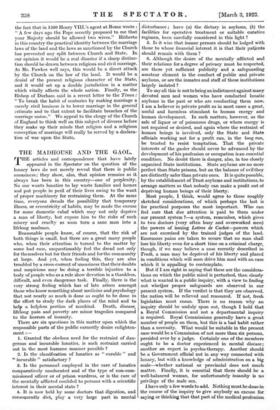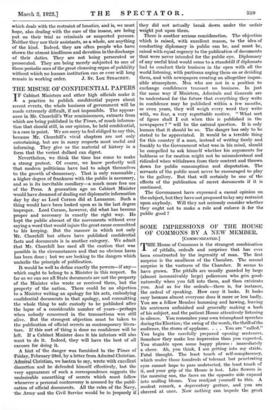THE MADHOUSE AND THE GAOL.
THE articles and correspondence that have lately appeared in the Spectator on the question of the lunacy laws do not merely reveal that there is public uneasiness; they show, also, that opinion remains as it always has been in this country—one of perplexity. IsTo one wants lunatics to lay waste families and homes and put people in peril of their lives owing to the want of proper machinery for restraining them. At the same time, everyone dreads the possibility that temporary illness, or eccentricity of habits, may be made the excuse for some domestic cabal which may not only deprive a man of liberty, but expose him to the risks of such misery and cruelty as soon turn a sane man into a lifelong madman.
Reasonable people know, of course, that the risk of both things is small, but there are a great many people who, when their attention is turned to the matter by some bad case, unquestionably feel the dread not only for themselves but for their friends and for the community at large. And yet, when feeling this, they are also troubled by a cross-current of uneasiness that their doubts and suspicions may be doing a terrible injustice to a body of people who as a rule show devotion in a thankless, difficult, and even dangerous task. Finally, there is the very strong Ebeling which has of late arisen amongst those who know something about medicine and psychology that not nearly as much is done as ought to be done in the effort to study the dark places of the mind and to help a. helpless portion of mankind. Death, disease, lifelong pain and poverty are minor tragedies compared to the horrors of insanity.
There are six questions in this matter upon which the responsible parts of the public earnestly desire enlighten- ment :-- 1. Granted the obvious need for the restraint of dan- gerous and incurable lunatics, is such restraint carried out in the most humane manner possible ?
2. Is the classification of lunatics as " curable " and " incurable " satisfactory ?
8. Is the personnel employed in the care of lunatics comparatively uneducated and of the type of non-com- missioned officer or of prison wardress, or is the care of the mentally afflicted confided to persons with a scientific interest in their mental state ?
4. It is now held by some doctors that digestion, and consequently diet, play a very large part in mental disturbance ; have (a) the dietary in asylums, (b) the facilities for operative treatment or suitable curative regimen, been carefully considered in this light ?
5. Is it wise that insane persons should be lodged with those to whose financial interest it is that their patients should remain with them ?
6. Although the desire of the mentally afflicted and their relations for a degree of privacy must be respected, are there yet sufficient publicity and a safeguarding amateur element in the conduct of public and private asylums, or are the inmates and staff of these institutions largely isolated ?
To say all this is not to bring an indictment against many devoted men and women who have conducted lunatic asylums in the past or who are conducting them now. I am a believer in private profit as in most cases a great, useful and harmless stimulant to human energy and human development. In such matters, however, as the sale of liquor or of poisonous drugs, or where energy is not required or desired, and again where the restraint of human beings is involved, only the State and State officials working not for a profit can, in the long run, be trusted to resist temptation. That the private interests of the gaoler should never be advanced by the development of his profession or occupation is an essential condition. No doubt there is danger, also, in too closely organized State institutions. State asylums are no more perfect than State prisons, but on the balance of evil they are distinctly safer than private ones. It is quite possible, by the establishment .of Trust asylums and institutions, to arrange matters so that nobody can make a profit out of depriving human beings of their liberty.
Most people, I think, would agree to these roughly sketched considerations, of which perhaps the last is for practical purposes the most important. Who can feel sure that due attention is paid to them under our present system ?—a system, remember, which gives to two doctors (very often busy and overworked men) the powers of issuing Lettres de Cachet—powers which are not exercised by the trained judges of the land. Enormous pains are taken to secure that no man shall lose his liberty even for a short time an.a criminal charge, though, if we may believe a case recently described in Truth, a man may be deprived of his liberty and placed in conditions which will soon drive him mad with an ease which it is appalling to contemplate.
But if I am right in saying that these are the considera- tions on which the public mind is perturbed, then dearly what is wanted is a public inquiry, with a view to finding out whetber proper safeguards are observed in our present system. If the verdict is that they are- observed, the nation will be relieved and reassured. If not, fresh legislation must ensue. There is no reason why an inquiry should be unduly spun out, though I hold that a Royal Commission and not a departmental inquiry is required. Royal Commissions generally have a great number of people on them, but this is a. bad habit rather than a necessity. What would be suitable in the present case would be a Commission of not more than six persons, presided over by a judge. Certainly one of the members ought to be a doctor experienced in mental disease; another an expert in psycho-therapy. Another should. be Government official not in any way connected with lunacy, but with a knowledge of administration on a big scale—whether national or provincial does not much matter. Finally, it is essential that there should be a well-balanced woman, for unfortunately insanity is no privilege of the male sex.
I have only a few words to add. Nothing must be done in the course of the inquiry to give anybody an excuse for saying or thinking that that part of the medical professian. 'hich deals with the restraint of lunatics, and is, we must hope, also dealing with the cure of the insane, are being put on their trial as criminals or -suspected persons. Neither they nor their assistants, as a whole, are anything of the kind. Indeed, they are often people who have 'shown the utmost kindliness and devotion in the discharge of their duties. They are not being persecuted or prosecuted. They are being merely subjected to one of those periodic uses of the great cleansing organ of publicity without which no human institution can or ever will long











































 Previous page
Previous page